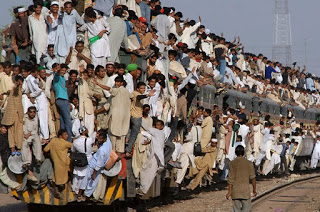Mass Transit System – Impacts, Advantages and Disadvantages
Mass transportation is any kind of transportation system in which large numbers of people are carried within a single vehicle or combination of vehicles. Airplanes, railways, buses, trolleys, light rail systems, and subways are examples of mass transportation systems. The term mass transit is commonly used as a synonym for mass transportation.
Mass transit system refers to public shared transportation, such as trains, buses, ferries etc that can commute a larger number of passengers from origin to destination on a no-reserved basis and in lesser time. It can also be termed as Public Transport.
Impacts – Advantages of Mass Transit Train:
The following will be the impacts or advantages of Mass Transit Train in Pakistan.
Environmental Impacts:
Mass transit train is believed to be more environmental friendly or eco-friendly than other public transport facilities. Private vehicles emit about twice as much carbon monoxide and other volatile organic compounds than public vehicles. Mass transit reduces the number of cars on the road which in turn reduces the pollution caused by individual cars.
Social Impacts of Mass Transit:
All members of the society irrespective of their financial status, religion or cast are able to travel which enhances the social integrity of the country. The necessity of a driving license is also eliminated. It is a blessing for those individuals who are unable to drive.
Economic Impacts of Mass Transit:
Mass transit train in Pakistan can improve the both usefulness and efficiency of the public transit system as well as result in increased business for commercial developments and thus serves to improve the economy of the country. Transit systems also have an indirect positive effect on other businesses. Mass transit systems offer considerable savings in labor, materials, and energy over private transit systems.
Reasonable Capacity:
Also mass transit train will allows a higher amount of load to be transported to far away destinations in lesser time because of its reasonable capacity than private vehicles. Because of their larger capacity offering them to carry high efficient engines they also help in saving fuels.
Employment opportunities:
The Mass transit train project will provide employment opportunities in Pakistan because the whole labour required for that project will be from Pakistan.
Other Positive Impacts:
Reduces congestion:
The main idea behind mass transit train in Pakistan is to reduce the number of vehicles on the road by providing a larger facility which carries higher number of passengers thus eliminating congestion.
Saves Time:
Mass transit train will reduces the travel time to a great extent as it moves at high speeds and stops only at specific spots.
Cost Effective:
Mass transit is comparably cheaper than other modes of public transport.
Disadvantages of Mass Transit Train:
Pakistan has to face the following consequences in order to establish the whole Mass Transit Train project. The disadvantages of that project are explained as under:
High Fares:
Rs. 140 aside. Will anyone pay such a fare? It’s too much for worker class who will be the main consumers of this service.
Expensive to import the technology:
Too expensive to import the technology and maintain the service. Pakistan has to pay the huge amount for the import of the technology as well as has to pay the engineers of china because it have been decided that the engineering staff will be from China.
Large investment:
The Mass Transit Train project requires a large investment of capital. The cost of construction, maintenance and overhead expenses are very high as compared to other modes of transport. Moreover, the investments are specific and immobile. In case the traffic is not sufficient, the investments may mean wastage of huge resources
Noise Pollution:
Another disadvantage of the Mass Transit Train is that it will create noise pollution in Pakistan.
Require Huge Capital:
The Mass Transit Train project require huge capital outlay, they may give rise to monopolies and work against public interest at large. Even if controlled and managed by the government, lack of competition may breed in inefficiency and high costs.










Post Comment